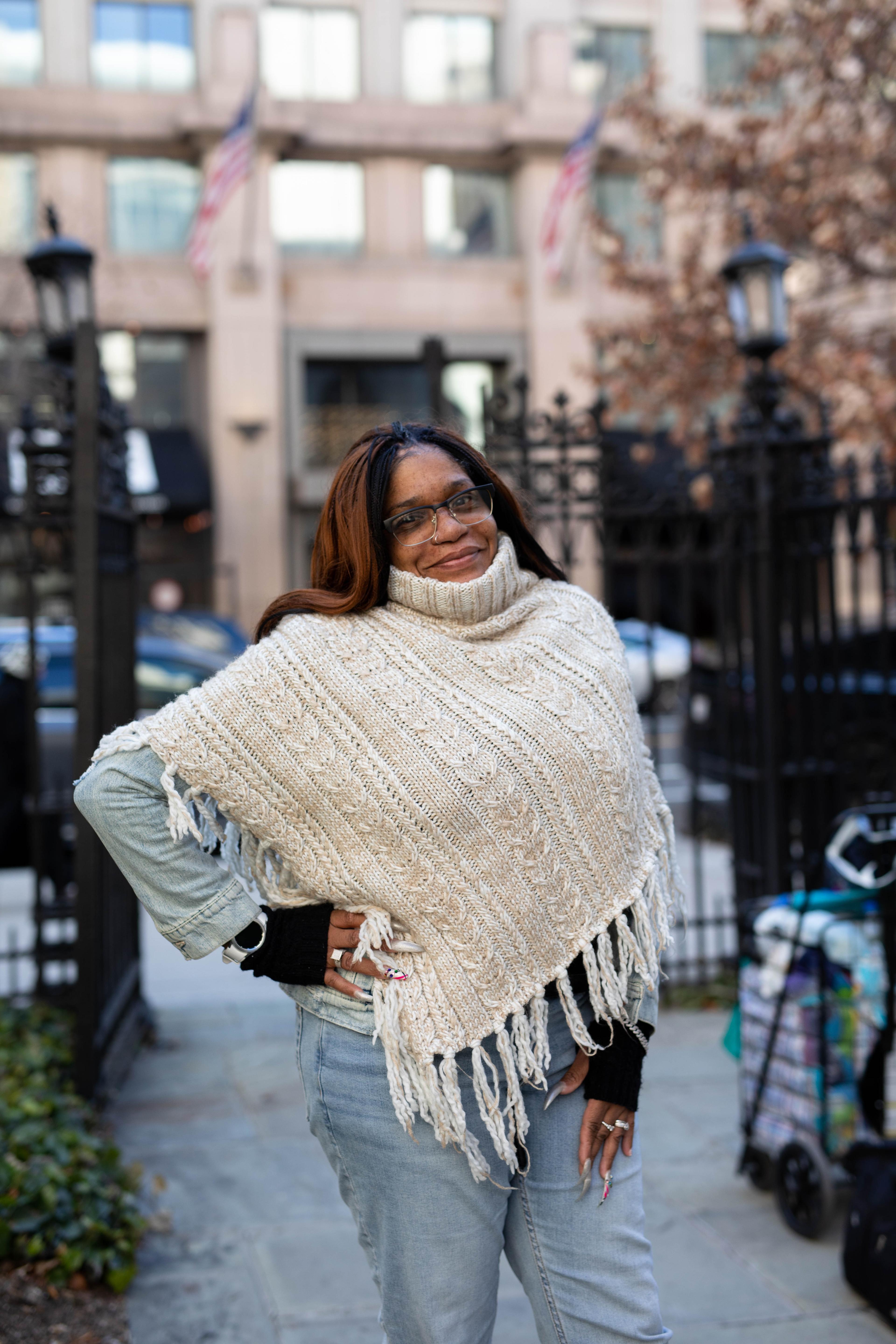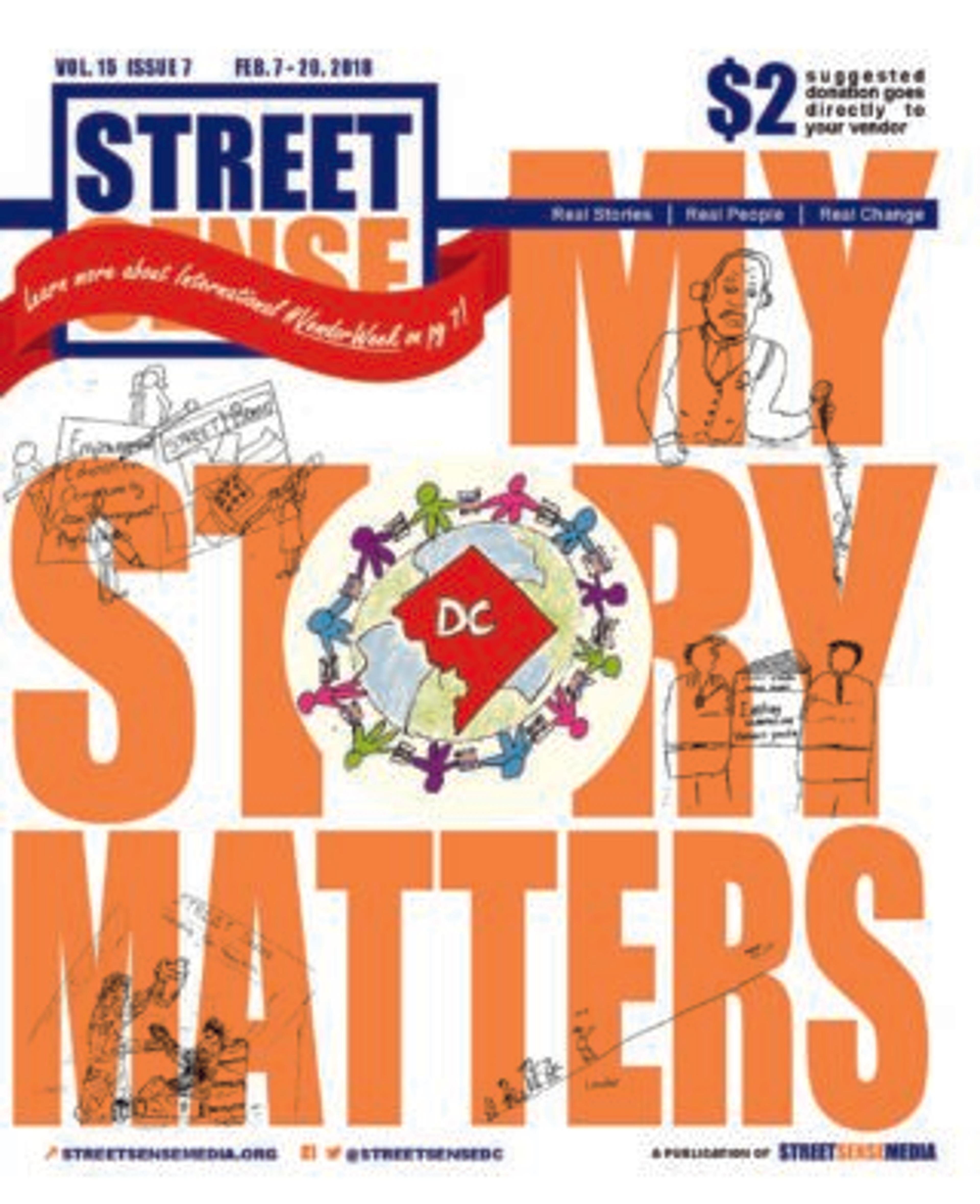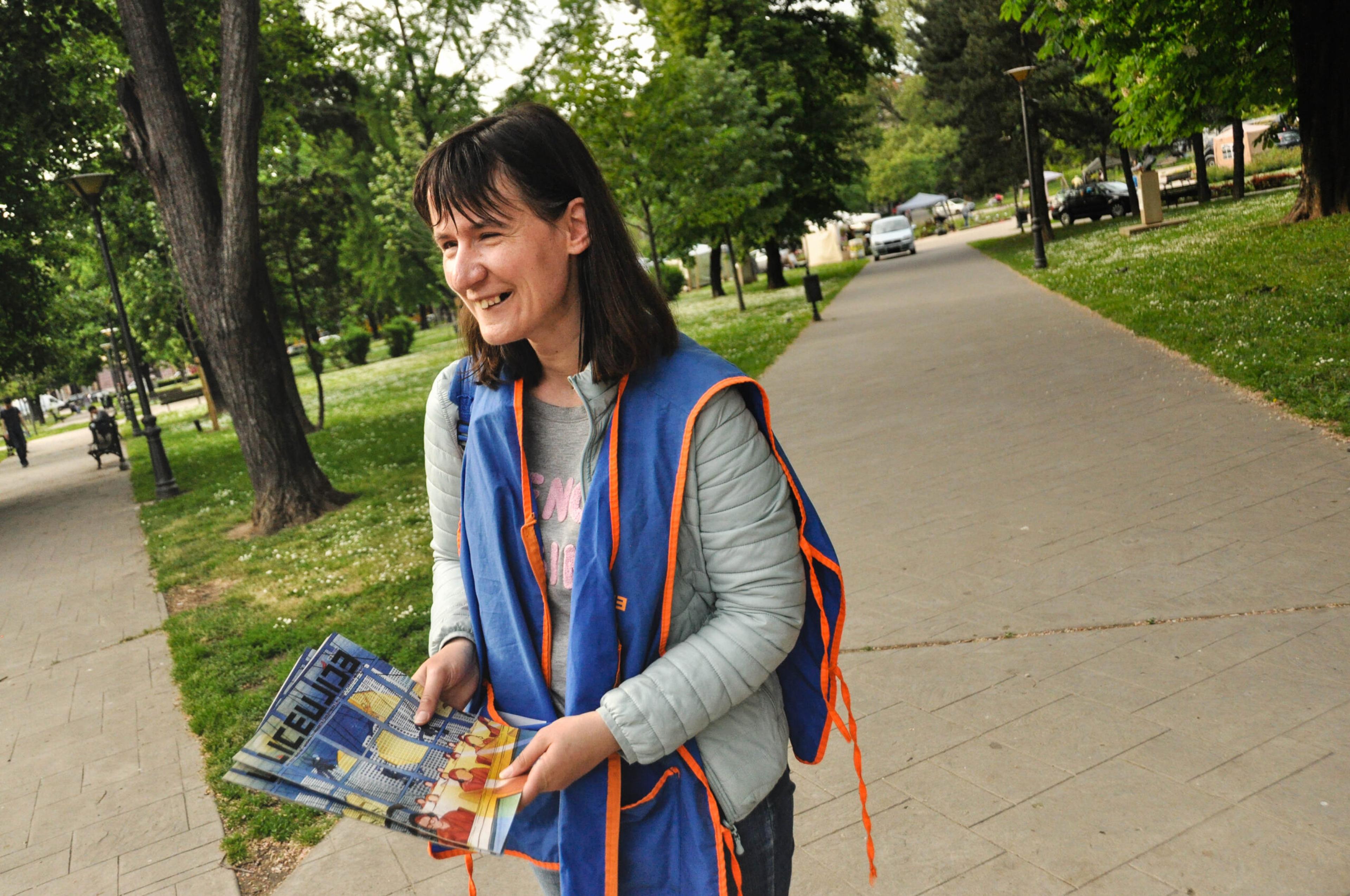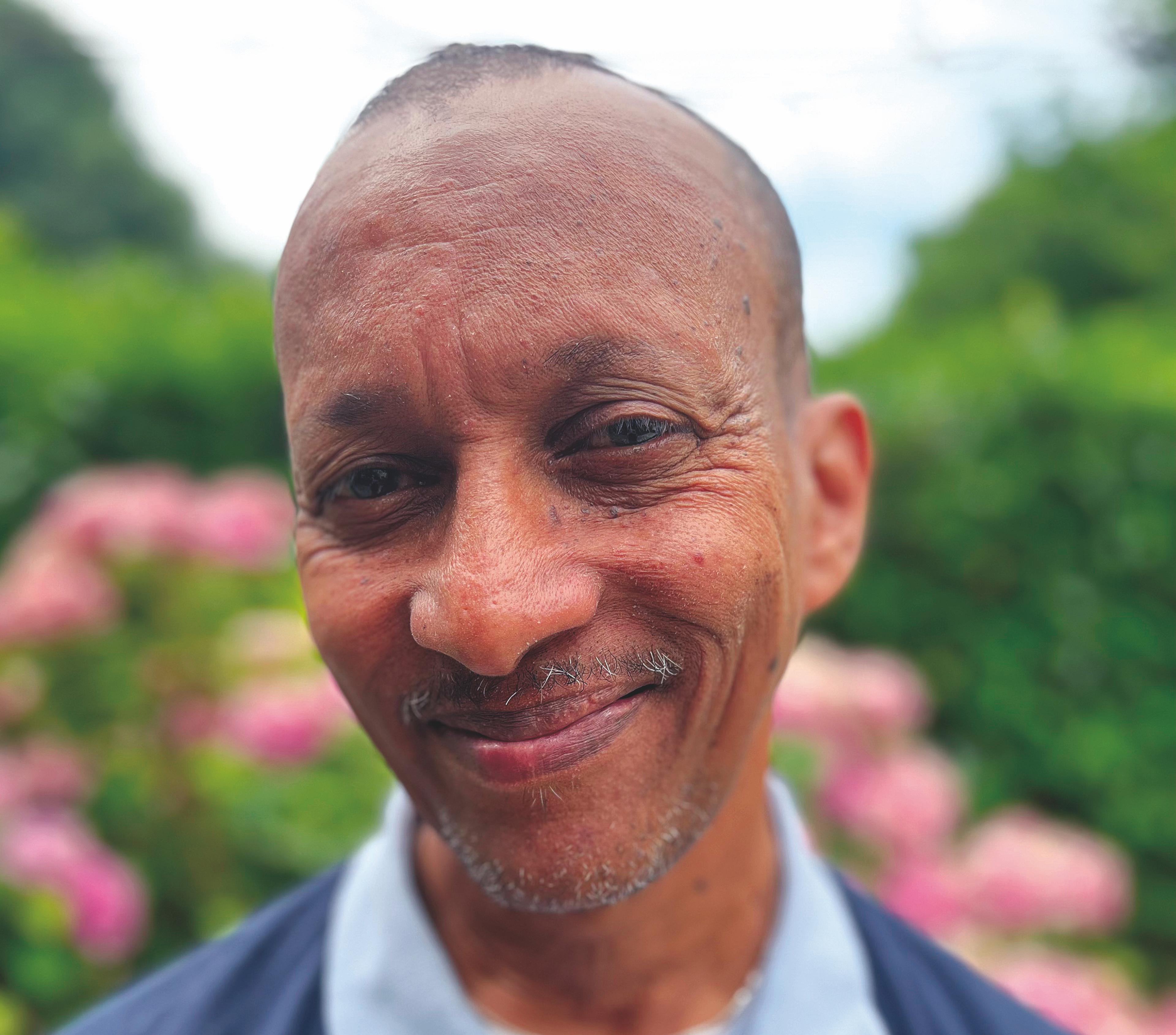“I’m coming back for them”: Street Sense vendor on securing housing

Nikkie Smith stands outside of the Church of Epiphany, where Street Sense’s offices are located. Photo by Gabriel Zakaib
By Ella Mitchell
- Vendor stories

After waiting three years for a housing voucher, Nikkie Smith had a vision for her apartment—namely, that it had a light color palette and was a place to call her own. In the green and white front room, Smith arranged her carefully selected furnishings: a beanbag that she can come home and relax in and a futon for when she hosts guests. For the back room, she picked out a black bed frame with glowing lights underneath.
“It doesn’t make up for the time I spent on the street, but it’s very beautiful,” said Smith, a Street Sense vendor and vendor program associate.
Smith’s new space marks the latest step in her journey out of homelessness. The 47-year-old moved into her Takoma-area apartment soon after receiving her housing voucher on 1 November 2024.
But the road to secure the voucher was far from easy. In fact, Smith said that the three-year-long wait was tumultuous. Confusion plagued the process, including miscommunications with the DC Housing Authority (DCHA) and social workers, as did delays, such as DCHA taking weeks to approve housing documents. On average, it takes people 241 days to move into housing after being matched to a voucher, and many wait for years before that match happens.
“My case managers lied to me for a year, had me waiting, thinking this is the end of this madness,” Smith said. “They embarrassed me.”
She claimed that her case manager mixed up the types of vouchers that Smith was eligible for, giving her the wrong information for over a year. When Smith asked about potential support to eventually purchase a house, she said that case workers made fun of her, telling her to get a job without knowing that she already worked.
Smith said that she felt embarrassed when she found out she had been operating based on incorrect information and frustrated that the people who were supposed to be helping were talking down to her.
“I was myself getting embarrassed about the wrong information that they gave me, and then I said something like, ‘Well, how can I get to a house?’” Smith said. “You know, I don't want to die in an apartment.”
So when Smith finally moved into her apartment, she said that the moment wasn’t all happy; the idea that everything could be taken away from her still flitted in the back of her mind.
“I know I should have been, like, really giddy after that,” Smith said. “But it was, like, I was happy, not like I usually would have been. I don’t know, things change.”
With the high cost of utilities and rent and an income that falls below half of the area’s median, Smith said that her new home doesn’t always feel permanent. Voucher holders have to dedicate at least 30% of their income towards rent and may still be responsible for utilities and other fees.
“I feel like, ‘Oh, I got the voucher, but soon enough it’s going to be snatched back,’” Smith said. “Because there’s all these rules now that I have the voucher. Rent is extremely high. The utilities are extremely high. I’m not allowed to make a certain amount of money or they’ll take the voucher. That’s the part that really irritates me.”
One of Smith’s main concerns is a looming benefits cliff, which means that a small increase in earnings can result in a sudden loss of public benefits. Smith worries about nearing the income limit while working, because while she then wouldn’t qualify for benefits, her income also wouldn’t be sufficient to cover the cost of living in DC.
Most forms of public assistance, such as food through the Supplemental Nutrition Assistance Program (SNAP) or housing vouchers, are income dependent. The maximum gross monthly income to qualify for SNAP, for example, is $1,632.
“I want to make more money. I want to go to school. I am going to go to Howard so I can be a case manager,” Smith said. “But if I make too much money, then I’m going to lose my voucher. That's not fair.”
The more money that a person makes, the less public assistance programs contribute. But sometimes, the rise in wages doesn’t keep up with the increase of expenses due to lack of public assistance, cutting off residents from benefits as their salaries rise. For a person earning $65,000 a year, this gap in coverage can stall their spending power at nearly one-eighth of their actual salary, a study by the Federal Reserve Bank of Atlanta found.
In 2024, the Council for Community and Economic Research found that DC has the ninth-highest cost of living out of any city in the nation, resulting in a disparity between eligibility for benefits and the cost of living in the District.
“It’s weird. Wouldn’t you want people to grow?” Smith said.
Growth—for both herself and others—is what Smith strives toward. Despite her worries, Smith plans to become a case manager through the city’s Peer Case Management Institute, which trains people with lived experience of homelessness to be case managers.
Last year, the DC Department of Human Services, in collaboration with the Community Partnership for the Prevention of Homelessness, Pathways to Housing DC, and Howard’s School of Social Work, launched the institute. The program includes seven weeks of classroom instruction and four weeks of field training, teaching skills like motivational interviewing, conflict de-escalation, and using lived experiences to connect with clients on a deeper level, according to the program’s website.
Smith is already doing a lot of that work. She conducts outreach work with the nonprofit People for Fairness Coalition, where she co-leads the Rhonda Whitaker Streets to Life Initiative, helping women experiencing homelessness to become involved in advocacy.
Smith also does outreach on her own, supporting others experiencing homelessness when she can.
“People need a cool pair of sneaks, phone, tablet—it doesn’t matter what you need,” Smith said. “I spend my money and I get it. So I did my own outreach, and I collaborate with other organizations. I don’t like to hear no. I don’t like to wait.”
Smith’s ambitions don’t stop at securing her apartment and working as a case manager. Next, she has set her sights on owning a house: one that her children may be able to live in one day. She’ll keep writing poetry about her life and experiences—all of which will contribute to the book that she’s working on.
And through it all, Smith will continue helping others experiencing homelessness. “I'm coming back for them,” she said.
Courtesy of Street Sense / INSP.ngo


